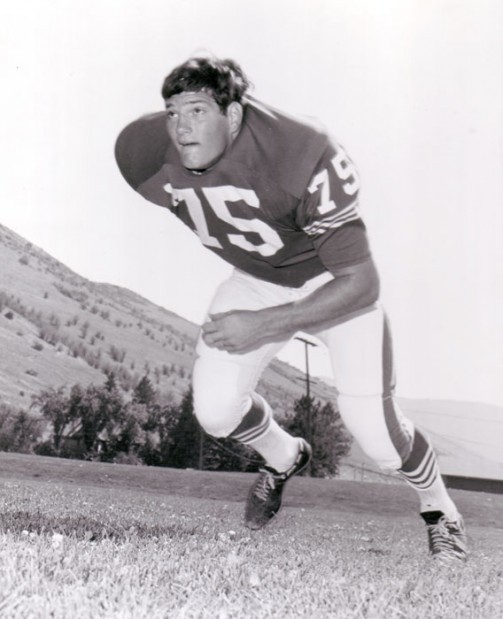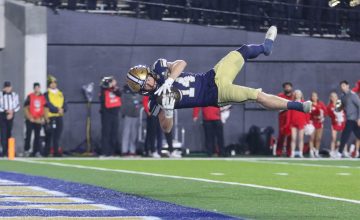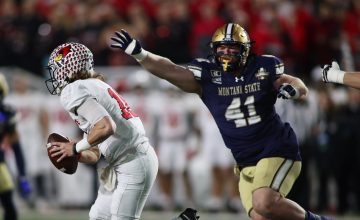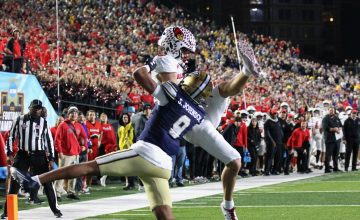EDITOR’S NOTE: Steve Okoniewski passed away at the age of 74 on February 25, 2024. This is the biography for his induction into the Montana Football Hall of Fame from 2021.
Steve Okoniewski hails from Bremerton, Washington and has made Green Bay, Wisconsin his home for most of the last three decades. But the former University of Montana All-American offensive tackle knows one thing for certain: coming to the Last Best Place changed his life for the better.
His path from the University of Washington to Everett Community College to Missoula launched a six-year professional career that led him to Atlanta, Buffalo, Green Bay and St. Louis.
And that strong affinity for the Treasure State also helped Okoniewski launch his second career as a high school coach and administrator. After retiring from the NFL and Canadian Football League in the summer of 1978, he began his second career in Deer Lodge. He moved to Wibaux for a short time before returning to Wisconsin. Yet Okoniewski longs for Montana every day.
Just received sad news: former #GrizFB all-time great DL Steve Okoniewski passed away over the weekend. He was 74.
— Skyline Sports (@SkylineSportsMT) February 26, 2024
Our @Colter_Nuanez had the honor of writing his bio for the Montana Football HOF.
Treasure State left indelible mark on Okoniewski – https://t.co/8twis5FC1m
“The best move I ever made in my life when I moved from the Seattle area to Missoula, Montana,” Okoniewski said in January of 2020 about eight months short of his 71st birthday. “If it wasn’t for that move, it’s hard to say what my life would’ve been. It’s the ultimate best decision I ever made in my life.”
Okoniewksi’s football career had its share of highs — like earning All-American honors for the 1970 Griz as Montana posted a 10-0 regular season record or getting selected with the 41st overall pick by Atlanta in the 1972 NFL Draft— and its lows; he never played a snap in a preseason game before the Falcons cut him as a rookie and he seemed to always be on the move.
With each new city, whether chasing professional dreams or coaching high school football or serving as a high school principal, Okoniewski has always felt the pull of the Rocky Mountains and the Blackfoot River.
His love for Montana first originated as a kid fishing the Madison River during a family trip to Yellowstone National Park. When he was 17 and about to begin his college career for Jim Owens and the Washington Huskies, Okoniewski and his adventurous friends loaded up their 1953 Chevy and took a trip through the heart of one of America’s most beautiful stretches of land from Missoula to Bozeman to the Paradise Valley to Yellowstone National Park.
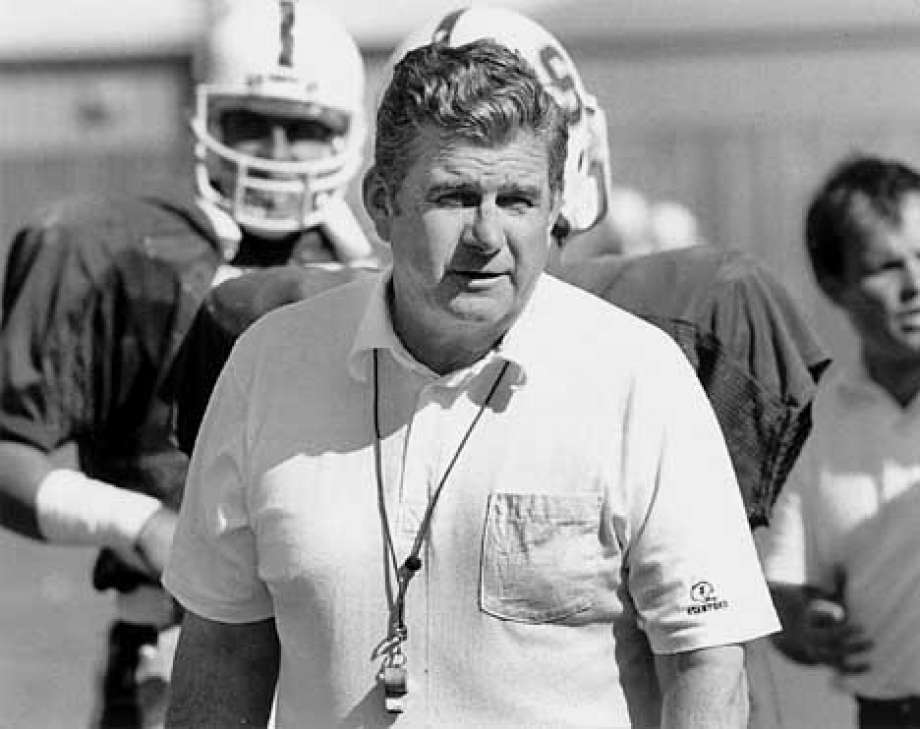
When Okoniewski needed “fresh start” after suffering an injury that cost him the 1969 season at Washington, he didn’t forget about Montana. So the 6-foot-3, 260-pound offensive tackle bought into former UM assistant Jack Elway’s recruiting to come to Montana to play for Jack Swarthout and a Griz team fresh off the first of two straight undefeated seasons.
At UM, Okoniewski blasted holes for All-American running back Arnie Blancas in Swarthout’s Wishbone offense, earning a reputation as one of the best and meanest offensive linemen in the West. Although he played defensive line for the duration of his NFL and CFL career, Okoniewski credits the foundation he built playing offensive line with the Griz, but more specifically the found memories he made in the Garden City, for setting the stage for the rest of his life.
“Montana is the absolute best,” the Class of 2021 inductee to the Montana Football Hall of Fame said. “The people I met like Jack Swarthout and Jack Elway…I knew Montana before Montana was discovered.
“The beauty of that state, the people, I have such a love for the state of Montana.”
Okoniewski grew up in Bremerton, a town of about 35,000 in Western Washington an hour ferry ride from downtown Seattle. Bremerton is a tough town, home to the Puget Sound Naval Shipyard and the Bremerton Annex of Naval Base Kitsap. The military influence was not lost on Norm Van Brocklin, the head coach of the Falcons who drafted Okoniewksi early in the 2nd round of the 1972 NFL Draft.
Before Okoniewski could compare stories about his hometown with Van Brocklin, he first had to find himself as a football player and a young man. After two quarters at Washington in 1968, he left the school and attended Everett Community College north of Seattle. There, he played with future NFL Pro Bowl running back Terry Metcalf among other standout players.
After a semester at Everett, Okoniewski returned to Washington but suffered what amounted to a season-ending knee injury in 1969. It proved to be the last straw.
“The University of Washington was just dreadful for me. They weren’t successful. They were 1-9 my last year,” Okoniewski said. “Football wasn’t any fun there at all. It was great fun in 1968 at Everett Community College. We had a great team.
“I went back to the University of Washington in 1969 and I’m limping around Seattle in the rain. It was just miserable.”
Jim Nordstrom, one of Okoniewski’s friends, was playing at Montana. Swarthout, Elway and UM offensive line coach Bill Betcher spent plenty of time recruiting the junior college circuit on the West Coast in those days. And Okoniewski felt like he needed an escape.
“I said to hell with it. You had the Vietnam War going on and it was a really free thinking, get back to nature thing,” Okoniewski said. “I always loved Montana. And Missoula was perfect for me. Going fishing, being in Missoula, floating the river, hunting, I have so many great memories back there. It’s a breath of fresh air beyond that.”
During his two seasons playing for the Griz, Okoniewski dominated. He earned first-team All-American honors from Kodak, the Associated Press and United Press International as a junior and senior. His final season with the Griz in 1971, he earned the team’s Paul Weskamp Award as the team’s outstanding offensive lineman. He was named to the Big Sky Conference’s Silver Anniversary in 1988, commemorating the best players in the history of the first 25 years of the league.
“Okoniewski is strong, athletic and plays with an edge,” Swarthout told the Billings Gazette in an article in the spring of 1971. “He is everything you want in an offensive lineman.”
During Swarthout’s nine seasons at Montana, he assembled a talented group through heavily recruiting junior college transfers to pair with his in-state talent. Missoula became a consistent stop for NFL scouts on trips to and from Seattle.
During Swarthout’s tenure between 1967 and 1975, 14 Griz went to play professional football. Okoniewski remembers players would never know when an NFL scout might be on campus for an impromptu workout. So the weight room warrior always tried to stay in his best possible shape so he could run, jump or lift in front of anyone that might give him a chance to extend his football career beyond the Big Sky.
Leading up to the draft, Okonowieski worked nights at Vince’s, a popular local Missoula restaurant. The night before the draft, which was in February back then, legendary NFL GM Bob Beathard called Okoniewski. Beathard had been the head scout for the Falcons from 1968 until 1971.
“Bobby told me I’d be pretty happy the next day,” Okoniewski said.
The next day when Okoniewski was mopping a floor. Vince’s owner, Vince Baronne, came into the restaurant and said, “Steve, I don’t think you will have to clean up this place anymore.”
“Then Bob Beathard tells me to get on a plane and boom, I fly out of Missoula to Atlanta,” Okoniewski said.
“A total transformation of your life. I’m just this poor college schlup mopping floors and the next day, I’m in Atlanta meeting with Norm Van Brocklin. That was amazing. And eye opening.”
Van Brocklin, the College and Pro Football Hall of Fame player turned coach, had served in the Navy during World War II. He had consequently spent time stationed in Bremerton during his service.
“After that first meeting, Norm Van Brocklin says, ‘You are from Bremerton, Washington? That’s one tough town,’” Okoniewski said. “He was stationed in Bremerton for two years. He used to tell stories about fighting with the Marines. I realized right away this wasn’t Jack Swarthout from Montana. This NFL is a little different deal.”
A standout performance in a college all-star game a month before the draft helped Okoniewski play his way into the second round. But he suffered an arch injury in the game.
When he reported to Atlanta, “I could barely do a toe raise.”
That combined with the heat and humidity of his first NFL training camp in Greenville, South Carolina made Okoniewski’s stint with the Falcons short lived.
“It was a race between the heat and the humidity every day,” Okoniewski said. “It would get up to around 90 for both. I would go into practice at 253 pounds, come out at 238. I had this arch injury and I couldn’t move at all laterally. I was just a total failure in the eyes of the Atlanta Falcons, I’m sure. But I never was able to perform so they cut me.”
That roster move helped Okoniewski’s path lead him to a front row seat to watch the rise of one of the most talented and mercurial players in NFL history. Stan Jones, a two-way starter for George Halas’s Chicago Bears in the 1950s and 1960s, was the defensive line coach for the Buffalo Bills in 1972. Jones had been through Missoula to scout Okoniewski a few years earlier.
“Stan Jones orchestrated I got picked up by Buffalo so all of a sudden, boom, I’m flying up from Atlanta to New York,” Okoniewski said. “You want to talk about a culture shock. You are down there in Atlanta and it’s peach trees and Southern glory and if you have ever been to Buffalo, it’s like Butte, America on a bad day with how tough it is and the brutal weather.
“There was 28 Okoniewskis in the phone book (laughs). My people. I love the place.”
O.J. “The Juice” Simpson had showed the promise of a Heisman Trophy winner out of USC his first three years in the NFL. But when Okoneiwski arrived in Buffalo for the 1972 season, Simpson’s star began to shoot into the stratosphere.
That season, he had his first 1,000-yard campaign, finishing with 1,251 yards and six touchdowns in a 14-game season. The following year, he set an NFL record by racing his way to 2,003 yards and 12 touchdowns. To this day, Simpson’s 1973 campaign is one of seven 2,000-yard seasons in NFL history.
“We were playing in the stadium where ‘The Natural’ was filmed. And O.J. was certainly that,” Okoniewski said. “War Memorial Stadium, in that town, it was so pretty and downright earthy.
“But they told you always to wear your helmet coming off the field because these guys would drop full cans of beer on you if you weren’t playing well.
“O.J. starts going nuts, taking the NFL by storm at that point. He was dominating everything. Howard Cosello is in our locker room all the time. Just the attention he generated was pretty amazing.”
Okoniewski was not on Buffalo’s active roster by the end of the 1973 season. But in the preseason before his second NFL season, Okoniewski had one of the best performances in the NFL to date, beating legendary Green Bay Packers offensive lineman Gale Gillingham for three tackles behind the line of scrimmage.
Fast forward to the summer of 1974. Okoniewski had just gone through a divorce. He was decompressing in Missoula, doing his favorite thing: fishing on the Blackfoot River. He would work out in the mornings, fish and canoe in the afternoons, go out at night.
But his NFL future was uncertain at best with the league’s owners locked in a labor dispute with the players’ association and his roster spot in Buffalo far from guaranteed.
“It was like, ‘Whoa man, life can’t really get much better than this,” Okoniewski said of that summer of ’74 in Missoula. “So one night, I’m sitting there at Stockman’s Bar slugging down a ham and cheese omelet and some guy comes up to me with a newspaper, sticks it in my face and says, ‘You are going to be a Packer.’
“They must’ve been impressed by that preseason game the year before (laughs).”
Because Buffalo is a working class town with manufacturing roots, Okoniewski thought the Bills players likely wouldn’t “break the line” and return to work instead of striking. So before he got the news of his trade to Green Bay, Okoniewski contemplated retiring.
Partly because of the strike and partly because of a 5-7-2 record in 1973, head coach and general manager Dan Devine had orchestrated nine trades that off-season to bolster Green Bay’s roster. One trade sent starting quarterback Scott Hunter to Buffalo. Okoniewski was part of the package.
Once he learned of his opportunity with the Packers, he learned a group of veteran players were ready to play. Okoniewski knew it was a chance for a fresh start. And the new opportunity proved a chance for real playing time with many established players staying on strike.
Shortly before he got the news of the trade, Okoniewski fell from a cliff face along the Blackfoot, sliding a couple dozen yards before falling in the river. So he showed up to Title Town with a hip to ankle scab along the side of one of his legs.
Despite the giant skin burn, he quickly won his teammates over with his work ethic in the weight room and his performance on the field.
Okoniewski recorded two sacks in Green Bay’s final preseason game against Cincinnati, setting the table for the best season of his professional career in 1974. In Devine’s final season , the Packers improved to 6-8 as Okoniewski started the 10 of the 14 games at left defensive tackle.
“The most fun I ever had playing football was those couple of games before the stars and veterans came back after the strike,” Okoniewski said. “I was playing against all these strike breakers and getting like three sacks in a half (laughs).”
The NFL’s roster size started fluctuating and shrinking in 1975. Okoniewski played in every game during the 1975 season, former Super Bowl winning quarterback Bart Starr’s first season coaching Green Bay, the team the Hall of Famer had quarterbacked to so much success as a player.
The slogan, “Fresh Start with Bart,” resonated throughout Wisconsin in 1975 but the Packers finished 4-10. Before the 1976 season, Okoniewski was the final player released by Starr.
He took a few weeks off, explored a tryout opportunity with the Denver Broncos and ultimately landed in St. Louis after impressing Cardinals’ head coach Joe Gibbs and prominent assistant Don Coryell during a tryout. He spent the 1976 and part of the 1977 season with St. Louis before getting cut once again. He retired from the NFL in the fall of 1977.
Okoniewski had been the first round draft choice of the Calgary Stampeders in the 1972 CFL Draft before choosing the Falcons. Calgary offered as much money as Atlanta. So when the CFL came calling a second time, Okoniewski elected to play the summer of 1978 with the Winnipeg Blue Bombers.
“It was a good summer job,” Okoniewski said. “I knew I was going to get cut because they can only keep a few Americans. So it was time to say, ‘Hey man, I’m this far away from getting a master’s degree. I said, if you are going to cut me, cut me. They did.”
Once he earned his master’s degree in athletic administration, Okoniewski got a chance to return to Montana. He got the job as the head football coach at Deer Lodge High before the 1978 season. Shortly after, he was name the school’s athletic director.
Behind the outstanding play by future Montana State Hall of Famer Joe Bignell, Okoniewski helped guide the Wardens to a state title in 1979. Bignell went on to become one of the greatest tight ends in Big Sky Conference history. He set an MSU single-season record for receptions during Montana State’s 1984 run to the Division I-AA national title. Okoniewski still considers his former pupil a friend and makes sure to visit the Bignell family ranch outside Drummond in Hall every time he visits Montana.
In 1985, Okoniewski began his migration back to the Midwest by taking a job as the principal and head football coach at Wibaux High in Eastern Montana. A few years later, he took a job as a principal at St. Francis High School outside Milwaukee during a time when the public high school desegregated, sometimes providing frightening challenges.
After three years surrounded by tumult and violence, Okoniewski moved to a job as a principal and football coach at Luxemburg-Casco High School about 20 miles from Green Bay in 1991. He worked there for nearly 30 years.
“Green Bay, there’s so many similarities between here and Montana,” Okoniewski said. “These are some hard-working farm kids. Now you have mega farms, but these kids were tough as hell. We won 11 state championships in wrestling when I was there.
“Once you got accepted by the community, it took a couple of years. These kids didn’t like me initially. But as time goes on, you get to know the community and the family orientation, the work ethic, the backgrounds of these kids, it was so much like when I was in Deer Lodge, Montana. There, I had a bunch of ranch kids too. They were just used to working.”
No matter the moves Okoniewski has made over the last 50-plus years, Montana has always held a special place in his heart and mind. He returns to the state to see friends and adventure at least once annually and, most years, several times more.
Okoniewski was inducted to the Kitsap Sports Hall of Fame, an event coincidentally emceed by legendary former Griz men’s basketball coach Jud Heathcote. Okoniewski is also in the Hall of Fame at Montana and Everett CC. His induction to the Montana Football Hall of Fame is deserved and fitting for many reasons, not the least of which giving him a chance to return to his favorite second home.
“When I get antsy in the springtime and the weather is good, I always think,’ I wish I was in Montana,” Okoniewski said. “It really is the greatest place in the world.”

